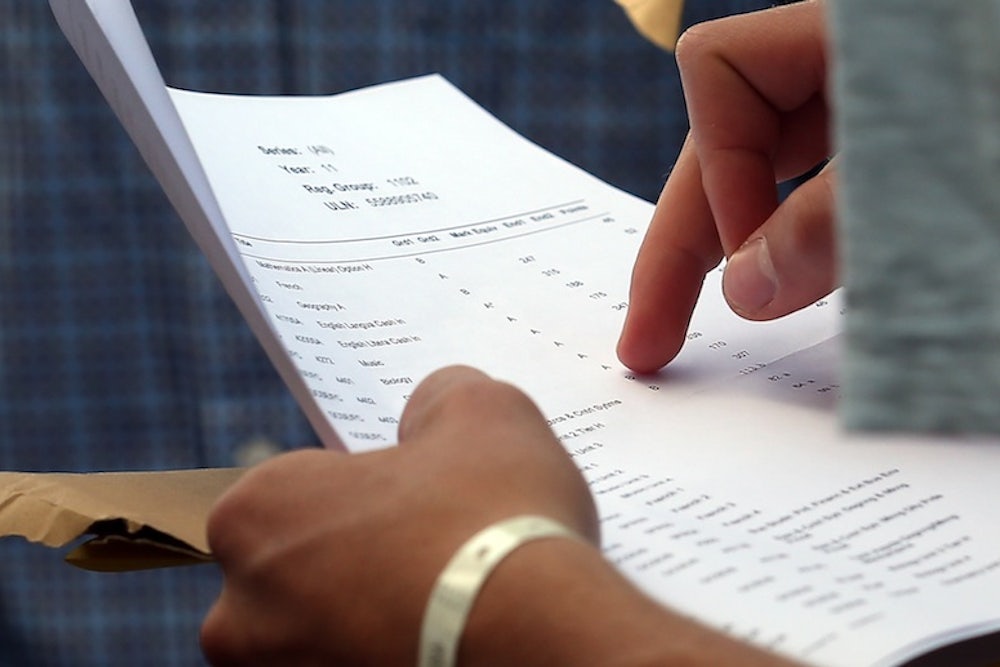Ezekiel Emanuel argues that more tests make students smarter, a proposition which is not as simple as it sounds. The validity of his claim comes down to such questions as "who writes the tests," "how quickly are the results reported," and "how are the scores used."
In short, we need fewer standardized tests. For the purposes Emanuel desires, today's standardized tests are useless. All are normed on a bell curve, and the results reflect the student's family income with uncanny accuracy. The SAT has become a measure of how much a student's family is able to pay for tutoring. Like all repetitive test preparation, practicing for the SAT raises test scores, but it doesn't mean the student is better educated or likelier to retain the material that was engorged for the test.
What he really admires, and appropriately so, are the regular weekly tests that he took in high school chemistry. His chemistry teacher Mr. Koontz knew what he had taught. He tested the students on what they had learned. He knew by the end of the day or over the weekend which students were keeping up and which ones were falling behind. He could act on that knowledge immediately to make sure that students understood what he thought he had taught and to explain it again to those who did not. He also learned whether to adjust his style of teaching to communicate the concepts and facts of chemistry more clearly to students. Mr. Koontz used the tests appropriately: to help his students. Consider what happens now with standardized tests. The test questions are written by some committee that doesn't know Mr. Koontz or his students. He can no longer teach what he thinks students should know about chemistry; he must prepare the students to pass a test that someone else wrote. The results of the tests will not be returned for months. Mr. Koontz can't give extra help to those who are falling behind because the scores may be reported when they are no longer his students.
Worse, when the scores are reported, Mr. Koontz and other teachers will not be able to see the answers of individual students, so they can't determine what the students know and don't know. In other words, the tests in common use today have no diagnostic value for students or teachers. Their only purpose is to give a grade to the student, and now—at Arne Duncan's insistence—to use the scores of the students to evaluate their teachers. Our testing regime has no value other than as a ranking and rating system, one that gives carrots to teachers if their students do well but beats them with a stick (or fires them and closes their school) if they don't. Most researchers say that teacher quality cannot be reliably measured by student test scores, because there are so many other variables that influence the scores, but the federal Department of Education is betting billions of dollars on it.
Emanuel wants more testing because testing, like a public hanging (in the words of Dr. Johnson), concentrates the mind. He thinks that it would be too burdensome for individual teachers to write their own tests, as his chemistry teacher did, so he thinks the job should be handed over to the U.S. Department of Education. Since the federal Department of Education has no test writers, the job of writing questions would be contracted out to the same big corporations that write standardized tests today, like Pearson, McGraw-Hill, and the Educational Testing Service. Mr. Koontz would not be able to teach what he taught; he would have to teach what he expects will be on the test. He would not be able to get student responses promptly, as he did when he wrote his own test. He could not diagnose his students' errors or his own shortcomings because he would not be testing what he taught. If the test includes written responses along with multiple-choice questions, the answers will be scored either by a computer or by minimum-wage essay scorers with little knowledge of chemistry, but instructions (a rubric) explaining how to grade the questions.
Emanuel is right and wrong. We need more tests written by teachers, graded by teachers, and quickly analyzed by teachers, to understand what their students are learning and what they are not learning. This is a job that belongs to Mr. Koontz, not to Arne Duncan or Pearson or McGraw-Hill.
Diane Ravitch is a historian of education who served on the National Assessment Governing Board. Her latest book is Reign of Error: The Hoax of the Privatization Movement and the Danger to America's Public Schools (Knopf).
